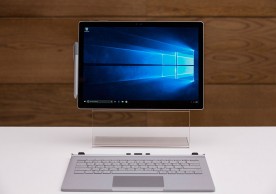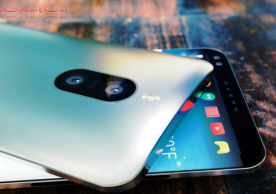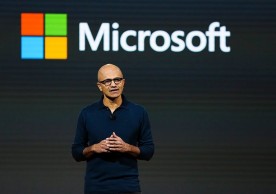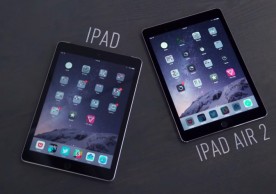Intel Ivy Bridge Processors Designed for Retina Display Macs and Windows 8 Tablets?
Jonathan Charles
Intel is looking to implement Ivy Bridge architecture into Macs equipped with Retina Display, as well as high-performance Windows 8 tablets. While not guaranteed, Intel hopes the tablets will implement Ivy Bridge.
At the Intel Developer Forum (IDF) in Beijing, Intel showed a slide where gaming controllers are attached to both sides of a tablet and another tablet with a keyboard attached.
Intel said the tablets would provide "leading performance." The devices could have processors with up to four GPUs, "low-power memory" and other features to extend battery life. Intel's tablet strategy has been based around low-power Atom chips.
Intel Vice President Kirk Skaugen said the upcoming Ivy Bridge processors are "Retina display capable if [their] OEMs choose to deliver on that." The new processors, Skaugen noted, will be able to power a resolution of 2560 x 1600, or four times that of the current 13-inch MacBook Pro lineup (check out Skaugen's 'Transforming the PC Experience' presentation, especially around the 14 mark). According to the latest reports, the current MacBook Pro is due for a refresh within the next few months.
The upcoming Ivy Bridge processors have largely been targeted at ultrabooks, which are ultra-thin and ultra-light laptops. Intel is pushing ultrabooks as an alternative to laptops, as users can consume and create content. The chip maker unveiled the Letexo or 'Cove Point' at IDF 2012, which combines a laptop and tablet into one device.
Intel has code-named the Ivy Bridge tablet platform 'Chief River,' which is also the code name for the ultrabook platform. Chief River supports USB 3.0, and could bring Thunderbolt ports - used in MacBook Pro's from early 2011 - to tablets.
Ivy Bridge tablets could be similar in specs to ultrabooks, Dean McCarron, principal analyst at Mercury Research, said.
"You are look at an evolutionary step. Particularly in the x86 space, the evolution is more convertible-type design where the keyboard is an optional piece," McCarron said.
McCarron added that tablets may appeal to consumers who need a Core processor. PCWorld noted tablet use is rising in enterprise, and some customers want high-performance devices without a built-in keyboard.
Most tables are currently shipping with ARM chipsets. Analysts said ARM offers better power consumption, but Intel is better on "raw performance."
"They [Intel] are going after every angle they can to get a foothold in the market," Jim McGregor, an independent chip analyst, added. He said Intel may be looking to use Ivy Bridge chipsets to disrupt ARM's dominance.
Intel is working with Microsoft and Google on tablets. Ivy Bridge processors offer higher performance, which may be relevant for some productivity applications.
(reported by Jonathan Charles, edited by Dave Clark)
most read
more stories from Tablet
-
Google Earth Lets Users Explore & Enjoy The Planet With New & Improved Features
Google is giving Google Earth a new look and features that will let the users enjoy the planet in a whole new way.
ernest hamilton -
Microsoft Surface Pro 5 & Surface Phone Highly Unlikely To Launch At Microsoft's Upcoming Event; Here's What's More Likely To Make An Appearance Instead [VIDEO]
Amidst the lack of an official announcement regarding the product Microsoft will be unveiling at its big spring event on May 2, there's hearsay that the Surface Pro 5 and the Surface Phone will not make an appearance despite multiple rumors hinting at the devices' looming launch.
ernest hamilton -
Live Images of the HTC U Ocean Leak: It's Ready To Save The Subpar Ultra U
HTC is regrouping to deliver a better unit to redeem its predecessor's shortcomings.
ernest hamilton -
Microsoft Surface Pro 5 Latest News: Hardware Launch Event Confirmed In May; No New Laptop Reveal Expected
The May hardware launch event has already been confirmed, however, analysts say it is possible that no new laptop will be revealed during the said event.
ernest hamilton -
Breaking Down Microsoft's May 2 Event: Why The Surface Pro 5 Does Not Matter
May 2 might not be the perfect time for a new Surface Pro device.
-
Apple iPad Air 2 To Oust The Aged iPad 4? See Details [VIDEO]
As Apple runs out of stock of the iPad 4, it will be replacing the device that consumers bring in for service with the newfangled iPad Air 2.
ernest hamilton -
iPad Pro Mini Latest News: Device To Possibly Release With Stylus Alongside iPad Pro 2
Another much-awaited device from Apple is the iPad Pro Mini, which is expected to be released alongside the iPad Pro 2 and will be equipped with Stylus.
ernest hamilton -
Huawei Matebook Latest News: Upcoming Devices Anticipated To Return As 3 Hybrid 2-in-1 Devices
Recent reports suggest that Huawei is gearing for the unveiling of three new 2-in-1 hybrid Huawei Matebook that will probably be unveiled during Computex in Taiwan.
ernest hamilton













